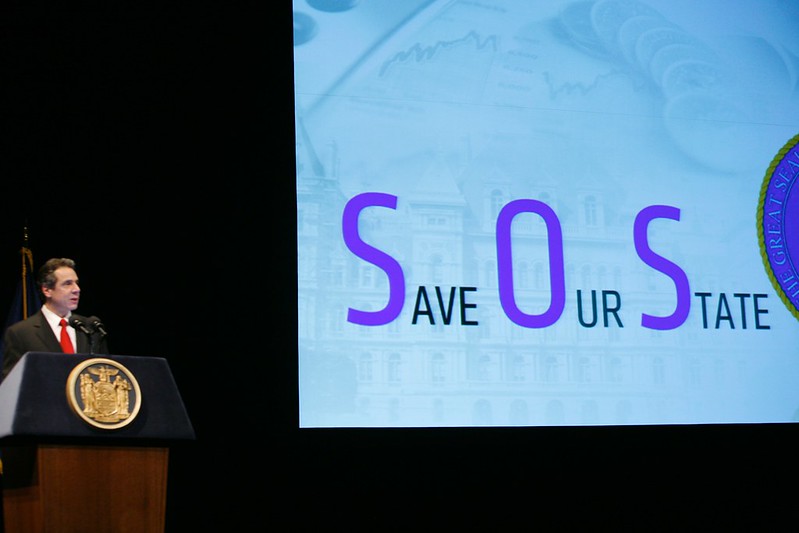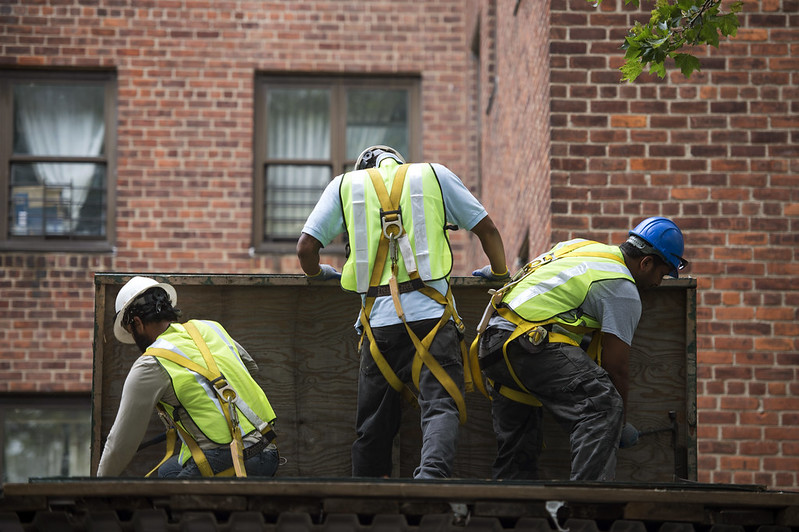It’s More Important Than Ever for the City to Take Care of Those Who Care for the Most Vulnerable New Yorkers

Council Member Helen Rosenthal, the author (photo: John McCarten/City Council)
To address the coronavirus crisis and save lives, New York City government and New Yorkers are mobilizing in ways never seen before. The City swiftly sent an unprecedented message to our human services sector -- the 250,000-plus employees who provide housing access, child and elder care, shelters, emergency food relief, mental health counseling, and disaster response. These workers -- traditionally undervalued, underpaid, and unappreciated -- were told that they are on the front-line of the COVID-19 crisis, and they will be appropriately supported for their dedication.
The City made it clear that all programs will be paid in-full, even if services have to be adjusted. Human services providers will be reimbursed for additional COVID-19 costs, such as safety supplies and staff shortage or personnel changes. And the City is streamlining its administrative practices to further assist providers. These are all profoundly helpful measures.
To its great credit, the City took these measures within the first days of the crisis, during a period of great uncertainty. At the same time, both the de Blasio administration and the city Comptroller’s office have worked to expedite payments to human services providers as soon as invoices come in.
But there is more to be done. Here are the next steps.
Front-line human services workers should be paid overtime for their hours spent working directly with the public. Why? Because they are risking their lives for those most in need: case workers and janitors who work at shelters; street homeless outreach workers; and staff at senior centers. As the City negotiates “incentive pay” for its own front-line staff, the non-profit agencies that provide city services should be given the same consideration.
For those who need it, front-line human service workers should be given child care vouchers to pay family members or trusted neighbors to watch their children.
Lastly, to put everyone’s mind at ease, human services providers should be given reassurance now that their contracts will be renewed in the next fiscal year, which starts this July 1. Now is the time to allow these mission-driven nonprofits to focus on the needs at hand. Just a few weeks into this crisis, we are already seeing a surge in unemployed New Yorkers who will need food pantry and other social safety net assistance and a lack of sufficient support for already vulnerable residents, such as seniors and people with disabilities.
The COVID-19 pandemic has exposed what many working class people have always known: the heroes in our society are very often the ones with traditionally undervalued roles. Now more than ever, we must see the value in the workers who care for our elders and young children; the staff who support our homeless shelters; the employees who keep our food pantries open; the counselors who staff our emergency hotlines; and many, many others.
We can’t get through this crisis without them. As quickly as possible, let’s move forward and fully support the human services sector’s critical work by providing childcare, financial security, and ongoing resources in the city budget.
***
City Council Member Helen Rosenthal is a Democrat representing parts of Manhattan. On Twitter @HelenRosenthal.
***
Have an op-ed idea or submission for Gotham Gazette? Email This email address is being protected from spambots. You need JavaScript enabled to view it.
How to Craft the Bare Bones State Budget New York Needs

Gov. Cuomo and the Legislature must budget thoughtfully (photo: Governor's Office, 2011)
This week the New York State Legislature is supposed to adopt a budget for the 2020-21 fiscal year that begins Wednesday, April 1. Legislators are facing an unparalleled challenge: the coronavirus has caused the bottom to very suddenly fall out of the state’s economy and therefore, its revenue. Without restaurants and stores open, there can be very little sales tax collected; hundreds of thousands of employees laid off means no personal income tax withheld from paychecks; slowed real estate sales means reduced transfer and other transaction-related taxes; and so on and so on.
Estimates on the loss of state revenue for the coming year range from Comptroller Tom DiNapoli’s $7 billion to State Budget Director Robert Mujica’s $15 billion. No one really knows and it depends on how quickly things can start getting back to normal, but there is no question the revenue fall off is going to be dramatic.
Governor Andrew Cuomo, understandably desperate about how to deal with the fiscal crisis while fighting the virus, has expressed frustration and disappointment that the U.S. Congress is not filling this huge budget hole. Congress has come through with aid that will help offset some of the costs of Medicaid, help with other virus-related medical costs, provide some support to state and local governments, and most importantly, give direct assistance to families and businesses. It may well be that there will be additional congressional action to stimulate the economy and, possibly, provide more state and local budget assistance.
But New York cannot and should not wait. Our budget problems are structural, and they have been brewing since long before the virus hit the U.S.
Now is the time for the governor and legislative leaders to show the moral courage and fortitude to do what they know is needed, even if it is not what the interest groups that usually prevail in Albany want:
-Stop adding billions in school aid, especially for wealthy districts that already spend more than $30,000 a year per student. There is absolutely no justification for increasing school aid; instead it should be reallocated to those districts that need it. If we don’t exercise control now, we will soon be faced with having to cut aid as Governor Patterson had to do in the Great Recession of 2008.
-Adopt the reforms recommended by the Medicaid Redesign Task Force. Yes, some of the reforms, such as imposing controls on fiscal gimmicks used by some families to avoid responsibility for the long-term care of their loved ones, may not go into effect until after the national state of emergency is lifted. But others can be implemented right away and far more is needed to cut the growth in long-term and personal care, which have been growing exponentially. All the reforms should be adopted now so they can go into effect when possible and far more Medicaid savings needs to be found ASAP.
-Cut back on economic development programs that are not generating a return on investment and/or are not essential. For example, we just cannot afford to give $400+ million a year in tax credits to the TV and film industry.
-Freeze public employee salaries, including not just the planned imminent across the board 2% increase but also automatic step increases. Yes, we value our hard-working and dedicated public-sector workers but now is not the time to give raises to already reasonably compensated people while so many New Yorkers are struggling to pay their rent and put food on the table. Public employee unions should support this policy until economic conditions improve.
-While many state agencies are already operating at a bare bones level, it is time to impose an across the board percentage cut in spending except for those activities that are directly related to fighting the coronavirus pandemic. Yes, this will be characterized as ‘draconian’ but there is no choice if the state is to husband its scarce resources to provide essential services.
-Resist calls to increase taxes on anyone. Now is surely not the time to raise taxes, even on wealthy people. We are already the highest taxed state, federal deductibility is severely limited, Wall Street earnings are plummeting, and more than ever, we need that small group of people who pay 40% of our income taxes to stay here and not move to less tax- (and coronavirus-) burdened states.
I watched Governor Cuomo’s daily press briefing on Sunday, in which he said he doesn’t want to wait for a federal bailout; he intends to move forward with a state budget on schedule. He is right. But it is also important to acknowledge that it is not the federal government’s fault the state is facing a major budget shortfall, and that much of our problem is that we have avoided dealing with rising costs (and low reserves) because no one wants to take the political heat. We need our representatives to step up and adopt an austerity budget on April 1. If circumstances change, it can be modified during the year and, we must all hope, pray, and do all we can to get out of this crisis so that the 2021-22 budget process is less fraught.
***
Carol Kellermann was president of Citizens Budget Commission from 2008 through 2018.
***
Have an op-ed idea or submission for Gotham Gazette? Email This email address is being protected from spambots. You need JavaScript enabled to view it.
Expanding Construction Prevailing Wage Mandates Would Worsen Our Economic Crisis

Construction and the coronavirus recession provoke key questions (photo: Demetrius Freeman/Mayor's Office)
As the coronavirus crisis continues to hit New York harder than any other state in the nation, Governor Cuomo, Senate Majority Leader Stewart-Cousins, and Assembly Speaker Heastie have undoubtedly answered the call and stepped up in a big way to protect New Yorkers and address statewide needs.
But as they consider ongoing negotiations over the state budget – amid a partial shutdown of New York’s massive construction industry – state lawmakers must ask themselves whether it makes any sense right now to ram through a controversial expansion of construction prevailing wage mandates.
That answer is an obvious and resounding no.
The proposal to expand prevailing wage mandates to many private construction projects was always a bad one – but it is even worse as we enter an economic downturn that may very well become a recession. That’s because it would eliminate good construction jobs and contracting opportunities when they will be most needed to help New York rebound from the COVID-19 outbreak and its ramifications.
We already know that this proposal would raise construction costs by around 30 percent – which translates to billions in additional costs – and make it impossible to advance major projects in New York City, Long Island, and throughout upstate communities. We already know it would inevitably leave tens of thousands of workers jobless and prevent small local contractors – especially MWBEs – from getting the business they need to keep the lights on. That’s why this proposal has been sensibly rejected year after year.
Now, just imagine those negative impacts hitting the construction industry a few months from now, as New York emerges from this public health crisis and attempts to jumpstart our economy by getting people back to work.
We already know we’re in uncharted territory. Amid a record-setting 3.3 million unemployment claims nationwide, New York State Comptroller DiNapoli has already sounded the alarm on an ensuing “deep recession,” with the comptroller and other state budget officials warning that the COVID-19 pandemic is projected to cost New York state government $9 billion to $15 billion in lost tax revenue, indicative of a massive loss of economic activity. And the $2 trillion stimulus bill the federal government passed in response to COVID-19 only provides $3.1 billion for New York – not nearly enough to offset the subsequent costs of the economic calamity.
Simply put, any special interests that support a prevailing wage expansion right now are essentially arguing that New York should address crushing economic challenges and rising unemployment by taking away more jobs and making it harder for businesses to operate. That would just be irresponsible.
And remember that when we say this isn’t just a downstate issue, we mean it. Our recent letter to state officials was signed by more than 20 groups statewide, including regional organizations from Buffalo, Albany, Binghamton, Plattsburgh, Brooklyn, and Long Island.
So, as state lawmakers finalize a budget that will hopefully help us rebuild New York’s economy, we hope they stay focused on just that – rebuilding. That won’t happen if they impose controversial new mandates that do more harm than good to workers and businesses alike.
***
Kyle Strober is executive director of the Association for a Better Long Island and Mitch Pally is CEO of the Long Island Builders Institute. On Twitter @KyleStrober & @MitchPallyLIBI.
***
Have an op-ed idea or submission for Gotham Gazette? Email This email address is being protected from spambots. You need JavaScript enabled to view it.




